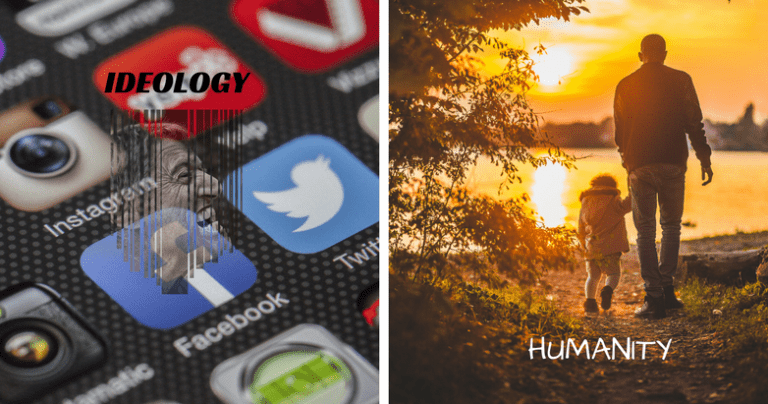
Padraig O’Malley, who was a facilitator during the Northern Ireland peace process, makes the case that each human being has two personas. One is the ideological persona; the other is the human persona.
The ideological persona is the part of us that believes in a certain type of ideology, from communism to humanism to capitalism to veganism to nationalism to protestanism to catholocism… the list of -isms goes on.
The human persona, however, is the part of us that is cross-culturally similar, the part of us that needs food, clothing, warmth, emotional support, family, humor, sympathy, likes music, and so on. It is the human persona we empathize with when we see people starving and want to do something to help them even if we disagree with their ideology.
Argument on TV
To better understand how these personas affect all of us, allow me to give you an example.
Earlier this year, I observed a contentious moment on Real Time with Bill Maher during an interview segment. Now, before you point out that most of his shows are argumentative and contentious, this time he was speaking with a Middle East reporter named Arwa Damon, a person he believed to be likeminded. They were talking about predominantly Muslim nations. When she suggested that, “we all want the same things,” he reacted viscerally by declaring, “no we don’t,” and the interview never recovered after that—Maher appeared appalled by the fact that she would even suggest such a thing.
However, if we compare the Maher interview with O’Malley’s idea of two personas, I believe that both Damon and Maher were right in their statements.
The reporter, Damon, who has spent an enormous amount of time in the region, was speaking of the human persona or the elements that are humanly common. The people she was speaking of wanted to see their kids grow up in a safe environment, for example, which is a shared human sentiment.
Maher, on the other hand, was speaking of the ideological persona and pointing to very real differences that exist between cultures and values, differences that need to be addressed.
The Danger of Dehumanization
Here is the point. O’Malley has pointed out that the only way to dehumanize another human being is to forget about the human persona and focus only on the ideological persona.
If we focus incessantly on ideological differences (which need to be addressed and reconciled, I am not denying that) and simultaneously forget about our human similarities, we have opened the door to hostilities.
The only way to stay out of this trap is to remember that each human being is a mix of both personas and that everyone’s human persona is much more like us than we realize.
This is easy to forget, especially in polarized political and religious atmospheres, but focusing incessantly on what people profess to believe in is a surefire way to create “the other” and dehumanize. And once a human being is somehow less than human, well, then it is much easier to deny rights, push their needs to the fringes, attack them vehemently on the Internet, or, in extreme cases, justify killing on a large scale.
(It is worth noting that on the Internet we encounter an alarming amount of ideology and very little humanity, which is why it is so easy to become angry and outraged while surfing the net.)
No Unknown Hostile Aliens
In the following passage, Betty Williams, the 1976 recipient of the Nobel Peace Prize, talks about how we can connect with the human persona.
“We believe in taking down the barriers, but we also believe in the most energetic reconciliation among peoples by getting them to know each other, talk each other’s languages, understand each other’s fears and beliefs, getting to know each other physically, philosophically, and spiritually. It is much harder to kill your near neighbor than the thousands of unknown and hostile aliens at the other end of a nuclear missile. We have to create a world in which there are no unknown, hostile aliens at the other end of any missiles.”
Getting to know someone can only be done in person.
It is one of the reasons why I created Experifaith. Not to make everyone believe in the same ideology, but to connect people on a human level through experience.
It is much easier to dehumanize another person when we obsess over differences than when we remember similarities. So, the next time we—yes, we, because I am not immune to this reaction to people I disagree with ideologically, especially in the wake of the last U.S. election—are tempted to brand another human being as a mere ideologue, we would do well to remember our human persona, and then remember their human persona.
In the end, we may never agree about ideology, but at least we don’t have to dehumanize each other in the process.
Gudjon Bergmann
Author & Interfaith Minister
Read, Experifaith: At the Heart of Every Religion, to learn more about the human persona approach to interfaith dialogue.
Pictures: Pexels.com CC0 license
















